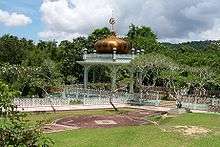Bolkiah
| Bolkiah | |
|---|---|
| 5th Sultan of Brunei | |
| Reign | 1485 CE - 1524 CE |
| Predecessor | Sulaiman |
| Successor | Abdul Kahar |
| Burial | Kota Batu, Brunei |
| Spouse | Princess Laila Mecanai |
| Father | Sulaiman |
| Religion | Sunni Islam |
Sultan Bolkiah was the fifth Sultan of Brunei. He ascended the throne of Brunei upon the abdication of his father, Sultan Sulaiman, and ruled Brunei from 1485 to 1524. His reign marked the Golden Age of Brunei[1] and saw the Sultanate become the superpower of the Malay archipelago. Bolkiah frequently travelled abroad to gain new ideas for the development of the country, as well as seeking suggestions from his various chiefs.
Reign
Sultan Bolkiah's victory over Seludong (modern day Manila)[2] by defeating Rajah Suko of Tundun in Luzon and as well as his marriage to Laila Mecana, the daughter of Sulu Sultan Amir Ul-Ombra, widened Brunei's influence in the Philippines.
This increased Brunei's wealth as well as extending Islamic teachings in the region, resulting in the influence and power of Brunei reaching its peak during this period. Bolkiah's rule reached essentially all of coastal Borneo,[1] as far south as Banjarmasin,[3] and as far north as the island of Luzon, including Seludong (present-day Manila) in the Philippines.[1]
Marriage
Bolkiah was married to Laila Mecanai the daughter of Sulu Sultan Amir Ul-Ombra and Datu Kemin.
Death and succession

After his death, sultan Bolkiah was succeeded by his son, Abdul Kahar.[1] He was buried in Kota Batu with his wife, Princess Leila Mechanai.
Uncertainties
The earliest historical record of the Sultans of Brunei is not clearly known due to the poor early documentation of Brunei history. Many elder members of the House of Bolkiah claim that their ancestors were the BaHassan and BaAlawi Saadah from Tarim and Hadhramawt in Yemen. In addition there has been an effort to Islamise the history, with the "official history" not matching up with verifiable foreign sources.[4] The Batu Tarsilah, the genealogical record of the kings of Brunei, was not started until 1807. Therefore, much of the intepretation on history relied on earlier Chinese sources and legends.[5] It seems that the early Sultanate of Brunei was dependent on Chinese support,[5][6][7] and perhaps early Sultans were of Chinese origin.[5] Furthermore the earliest Sultans may have been practising the Hindu or Buddhist religions, with early names indicating this origin.[4]
See also
Notes and references
- 1 2 3 4 Sidhu, Jatswan S. (2009). "Bolkiah, Sultan (r. 1485–1524)". Historical Dictionary of Brunei Darussalam (second ed.). Lanham, Maryland: Scarecrow Press. p. 37. ISBN 978-0-8108-7078-9.
- ↑ Although this is the interpretation based upon the work of Antonio Pigafetta, other authorities suggest that Seludong may have referred to the Serudong River, which is in northeastern Borneo, and not to the island of Luzon at all. Saunders, Graham (2002). History of Brunei (second ed.). New York: RoutledgeCurzon. p. 42. ISBN 978-0-7007-1698-2.
- ↑ Saunders 2002, p. 45
- 1 2 "Brunei". 4dw.net. Retrieved 18 January 2015.
- 1 2 3 Elisseeff, Vadime (January 2000). "Chapter 8: A Brunei Sultan of the Early Fourteenth Century — A Study of an Arabic Gravestone". The Silk Roads: Highways of Culture and Commerce. Berghahn Books. pp. 145–157. ISBN 978-1-57181-222-3. Retrieved 26 December 2013.
- ↑ "Malay History: What's Missing in Malaysian History Books". Malaysianunplug.blogspot.co.uk. Retrieved 18 January 2015.
- ↑ "The golden history of Islam in Brunei". The Brunei Times. Retrieved 18 January 2015.
